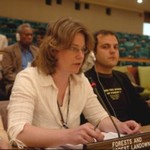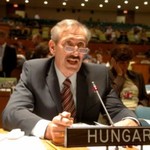 Speaking for farmers and small forest landowners, Natalie Hufnagel called for securing land tenure and property rights, and acknowledging the contributions of forests to livelihoods.
Speaking for farmers and small forest landowners, Natalie Hufnagel called for securing land tenure and property rights, and acknowledging the contributions of forests to livelihoods.
Speaking for the EU, Octavia Modert of Luxembourg noted that decisions would have to be postponed if targets and goals could not be agreed upon.
Martins Roze of Latvia called for clear definition of the state's role in achieving sustainable forest management
Duason Jovic of Serbia and Montenegro stressed the importance of decentralization, democratization and participatory planning
Juha Korkeaoja of Finland expressed disappointment that a legally-binding instrument (LBI) would not be achieved, and said that soft law would draw soft commitment.
Elliott Morley of the United Kingdom stressed that the status quo is unacceptable
 Imre Németh of Hungary supported voluntary responsibility on agreed guidelines.
Imre Németh of Hungary supported voluntary responsibility on agreed guidelines.
André van der Zande of the Netherlands stated that the credibility of all forest-related processes is jeopardized by the absence of action.
Beat Nobs of Switzerland stressed its preference for an LBI that would guarantee financing, but added they are ready to explore consensus alternatives that contain time-bound goals complemented by national targets.
Jim Farrell of Canada professed commitment to official development assistance and the IAF, but cautioned that they and other countries would pursue alternative processes if the UNFF fails to address deforestation and forest degradation.



